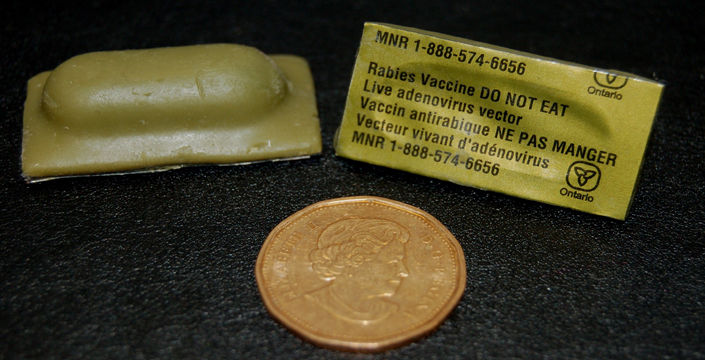
If you haven’t heard already, rabies is back in Ontario. In the last 18 months, hundreds of raccoons and skunks have tested positive for rabies. Rabies is a virus found in the saliva of infected mammals and can be spread by an animal bite that breaks the skin, or if the infected animal’s saliva gets into an open wound or mucous membrane.
To help stop the spread of rabies in our province, the Ministry of Natural Resources and Forestry (MNRF) is dropping vaccine baits in targeted areas, including Wellington and Dufferin counties. The vaccine bait is designed to be eaten by raccoons, skunks and foxes because these wild animals are the most common carriers of rabies.
When will the baiting start?
Baiting has already started. In urban areas, it will occur by hand until October. In forested and agricultural areas, the bait will be dropped by helicopter or yellow twin otter aircraft until the end of August.
What does the bait look like?
The bait comes in an army-green blister pack about the size of a loonie. It will also be labeled as a rabies vaccine.
If you find a bait outside, what should you do?
Do not touch it or open it. While the packets are not harmful to people or pets, leave it in its place so that wild animals can find it and eat it. If you find a bait in an area where children play, you can carefully move it – put a plastic bag over your hand before picking it up and move it to a more suitable green space.
How else can you protect yourself from rabies?
Vaccinate your dogs and cats (even barn cats). If a pet is not vaccinated and comes into contact with a rabid animal, the pet could spread rabies to their owner and family. Never touch or approach unfamiliar or wild animals. Contact animal control immediately if you see an animal behaving strangely. If you feel threatened by an aggressive animal, contact police.
Rabies is a life-threatening disease. If you are ever bitten or scratched by an animal, you should go to your family doctor or the emergency department as soon as possible.
For more information about rabies check our Rabies and Animal Bites section.
